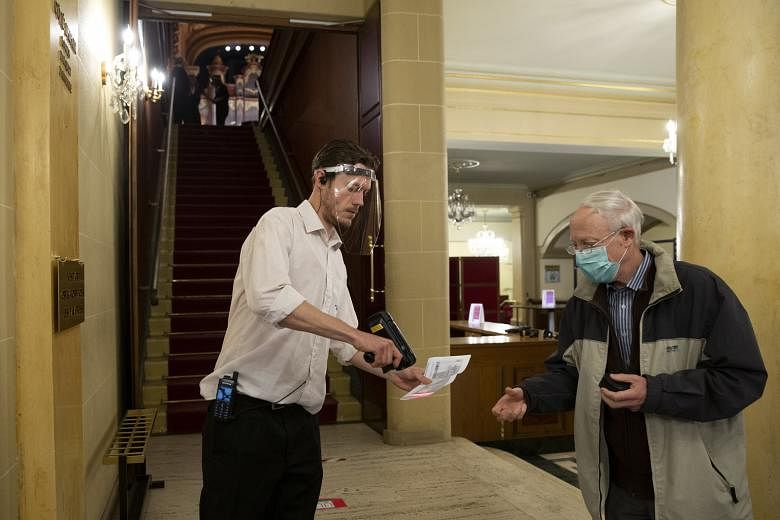Singapore is among the safest places to live in during the Covid-19 pandemic, a new study says, indicating that the authorities are well placed to lift restrictions aimed at reducing the spread of the coronavirus.
The country ranked fourth, just ahead of Japan, out of 200 nations and territories in a survey that took in 11,400 data points in categories that include quarantine efficiency, monitoring and detection, as well as emergency preparedness.
The top spot went to Switzerland followed by Germany in the ranking released on June 4 and done by Deep Knowledge Group, a consortium of companies and non-profit organisations owned by Deep Knowledge Ventures, a Hong Kong-based investment firm.
The results bode well for efforts to lift some of the safe distancing measures after the circuit breaker period ended on June 1.
Singapore also finished fourth in the same survey released in April just as Covid-19 cases surged, owing to outbreaks among migrant workers living in dormitories.
"As regions begin to prepare for relaxing (of) lockdown conditions and economic freezing mandates, factors which impact their capacity to withstand economic fallout as a result of the pandemic take on greater levels of importance," the report said.
Switzerland and Germany took top marks, leap-frogging previous winner Israel, because they acted early to contain the number of new cases, the report said.
With a population of 83 million, Germany's peak in new cases came on March 28, with nearly 6,300 cases. Switzerland's came a day earlier, with 1,447 cases.
By comparison, Singapore's worst day of the pandemic came three weeks later, with a disproportionately large 1,426 new cases on April 20.
Other places, which are deemed to have contained the virus but still saw second waves of infections, also fared relatively less well.

Taiwan, which has had zero new cases for at least a week, ranked 16th. Vietnam, which posted a record 25 new infections on May 15, clocked in at No. 20.
Most recently, Germany reported 214 new cases, compared with Singapore's 386 on Monday.
In Switzerland, it was nine.
"It is clear they survived and surpassed a very critical stress test," the report said of the Europeans.
-
Republic praised for tech edge and strong monitoring, detection
-
Strong monitoring and detection, a meritocratic government and a "high degree" of technological sophistication helped make Singapore one of the safest places to live in during the Covid-19 pandemic.
Those qualities helped Singapore execute effective quarantines as well as social distancing and mandatory mask wearing, the Deep Knowledge Group survey of 200 countries and territories said.
The report credits Singapore's use of location data, video camera footage and the app TraceTogether, which tracks and records close encounters with infected people, for helping to contain the coronavirus.
Singapore has the highest number of coronavirus cases in Southeast Asia, but heavy investment in equipment, facilities and professionals prevented healthcare services from becoming overwhelmed.
Recent investments in artificial intelligence as well as digital services bode well for future improvements in monitoring as well as testing and treatment for Covid-19, the report said, listing Singapore's opportunities for improving its effectiveness in fighting the virus.
But the country is highly reliant on migrant workers and supply chains, which leave it vulnerable to shortages of labour and goods when it closes its borders.
It lost 22,000 foreign workers between last December and March this year, the report said, citing Ministry of Manpower data.
A large elderly population, which has the biggest chance of succumbing to the coronavirus, also makes it vulnerable to future outbreaks.
A quarter of Singaporeans older than 40 have at least one chronic disease like diabetes, the report noted. But on balance, Singaporeans' attributes make the country resilient to future outbreaks.
A small island, Singapore moved quickly to shut down non-essential cross-border travel, helping to neutralise transmission of the virus.
When it comes to the less tangible elements like culture, the Republic did well too, owing to a disciplined and orderly population, the report said.
"This, in combination with the very strict penalties put in place for violating quarantine and social distancing mandates, has helped to reduce overall infection spread risk."
Jeffrey Hutton
Their recent moves in relaxing lockdowns and resuming economic and social activities are tangible evidence of this success, it added.
Even so, Singapore took top marks when it came to monitoring and detection, and squeaked past Switzerland to take second place on how it conducted its quarantine.
By comparison, Singapore fared relatively less well when measured for government efficiency, the survey said.
"The majority of positively scoring territories are located in Asia specifically… and one of the most common factors among them include governments with a high degree of emergency preparedness and rapid mobilisation of resources," the report said, singling out Singapore and China, which scored seventh.
But the report also illustrates how the pandemic is moving into a new, more dangerous phase in which richer countries are battening down the hatches to wait for a vaccine while poorer countries struggle to even test for the virus.
Mali, Rwanda and South Sudan are the most dangerous places to live out the Covid-19 pandemic, according to the survey.
In Indonesia, which ranked 97th, just ahead of Cambodia, officials have begun a phased winding down of social distancing restrictions, even as the tally of new infections climbs.
As recently as Saturday, new infections hit a record of 996 cases.
Still, officials are confident the capital can mitigate the spread.
Jakarta's MRT service will cap passengers at 70 per car, with temperature checks on commuters.
The MRT, which went into operation early last year, will even enlist the military to enforce a strict no-talking policy aimed at stopping commuters from transmitting the coronavirus to others, Mr William Sabandar, president director of Jakarta MRT, told The Straits Times.
"If we pass this test, we can safely reopen and prevent a second wave," he said.


